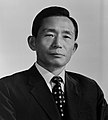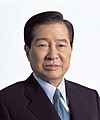Portal:South Korea
 |
환영합니다! / Welcome To The South Korea Portal!  South Korea, officially the Republic of Korea (ROK), is a country in East Asia. It constitutes the southern half of the Korean Peninsula and borders North Korea along the Korean Demilitarized Zone; though it also claims the land border with China and Russia. The country's western border is formed by the Yellow Sea, while its eastern border is defined by the Sea of Japan. South Korea claims to be the sole legitimate government of the entire peninsula and adjacent islands. It has a population of 51.96 million, of which half live in the Seoul Capital Area, the ninth most populous metropolitan area in the world. Other major cities include Busan, Daegu, and Incheon. The Korean Peninsula was inhabited as early as the Lower Paleolithic period. Its first kingdom was noted in Chinese records in the early 7th century BCE. After the unification of the Three Kingdoms of Korea into Silla and Balhae in the late 7th century, Korea was ruled by the Goryeo dynasty (918–1392) and the Joseon dynasty (1392–1897). The succeeding Korean Empire (1897–1910) was annexed in 1910 into the Empire of Japan. Japanese rule ended following Japan's surrender in World War II, after which Korea was divided into two zones: a northern zone, which was occupied by the Soviet Union, and a southern zone, which was occupied by the United States. After negotiations on reunification failed, the southern zone became the Republic of Korea in August 1948, while the northern zone became the communist Democratic People's Republic of Korea the following month. In 1950, a North Korean invasion began the Korean War, which ended in 1953 after extensive fighting involving the American-led United Nations Command and the People's Volunteer Army from China with Soviet assistance. The war left 3 million Koreans dead and the economy in ruins. The authoritarian First Republic of Korea led by Syngman Rhee was overthrown in the April Revolution of 1960. However, the Second Republic failed to control the revolutionary fervor. The May 16 coup of 1961 led by Park Chung Hee put an end to the Second Republic, signaling the start of the Third Republic in 1963. South Korea's devastated economy began to soar under Park's leadership, recording one of the fastest rises in average GDP per capita. Despite lacking natural resources, the nation rapidly developed to become one of the Four Asian Tigers based on international trade and economic globalization, integrating itself within the world economy with export-oriented industrialization. The Fourth Republic was established after the October Restoration of 1972, in which Park wielded absolute power. The Yushin Constitution declared that the president could suspend basic human rights and appoint a third of the parliament. Suppression of the opposition and human rights abuse by the government became more severe in this period. Even after Park's assassination in 1979, the authoritarian rule continued in the Fifth Republic led by Chun Doo-hwan, which violently seized power by two coups and brutally suppressed the Gwangju Uprising. The June Democratic Struggle of 1987 ended authoritarian rule, forming the current Sixth Republic. The country is now considered among the most advanced democracies in continental and East Asia. (Full article...) Selected article -Hyundai Motor Company, often referred to as Hyundai Motors, (Korean: 현대자동차; RR: Hyeondae Jadongcha listen) and commonly known as Hyundai, (Korean: 현대; Hanja: 現代; RR: Hyeondae, IPA: [ˈhjəːndɛ]; lit. 'modernity') is a South Korean multinational automotive manufacturer headquartered in Seoul, South Korea, which was founded in 1967. Currently, the company owns 33.88 percent of Kia Corporation, and fully owns two marques including its luxury cars subsidiary, Genesis, and their electric vehicle brand Ioniq. The three brands altogether make up the Hyundai Motor Group. Hyundai operates the second largest automobile manufacturing facility in Ulsan, South Korea which has an annual production capacity of 1.6 million units. The company employs approximately 75,000 people worldwide. Hyundai vehicles are sold in 193 countries through 5,000 dealerships and showrooms. As of November 2024, Hyundai is the world's third-largest carmaker in terms of production, falling behind competitors Toyota and Volkswagen. (Full article...) Selected image The 2010 G-20 Seoul summit was the fifth meeting of the G-20 heads of government to discuss the global financial system and the world economy. It was held in Seoul, South Korea. More did you know -
In the news
This is a Good article, an article that meets a core set of high editorial standards.
"Eat You Up" is a song recorded by South Korean recording artist BoA for her twelfth studio and debut English eponymous studio album (2009). It was released on October 16, 2008 in Japan as the lead single from the album. The song was written by Remee and Thomas Troelsen, while production was handled by Henrik Jonback. The song was BoA's first attempt into the Western market, particularly North America. Musically, the track was described as an electronic dance song with elements of R&B. Upon its release, "Eat You Up" garnered positive reviews from music critics. Many critics commended the song's electronic and dance-infused composition, and praised the song's commercial appeals; they also felt it was a choice to release through Western markets, and felt BoA's English skills had improved. It was successful on the US Billboard Dance Club Songs chart, peaking at number eight and staying in the chart for 12 consecutive weeks. Two music videos were created for the single; the first had BoA dancing in ballet recital with back-up dancers, whilst the second has her dancing in a utopian-inspired planet. BoA performed the single during several of her concerts, including her Nowness and Who's Back? concert tours. Since its release, the song has received several recognitions and has been listed on several best lists by Eastern and Western publications. "Eat You Up" is one of the first songs by a Korean artist to be produced and written by Western producers, and is recognized as a key factor to the Korean Wave movement. (Full article...) General images -The following are images from various South Korea-related articles on Wikipedia.
Did you know (auto-generated)
WikiProjectsSee WikiProject Korea for collaborating on South Korea topics, and more broadly, on all things Korea-related. South Korea topics
CategoriesAdministrative divisions of South Korea
Related portalsEast Asia Associated WikimediaThe following Wikimedia Foundation sister projects provide more on this subject:
Web resources
SourcesDiscover Wikipedia using portals |
























































